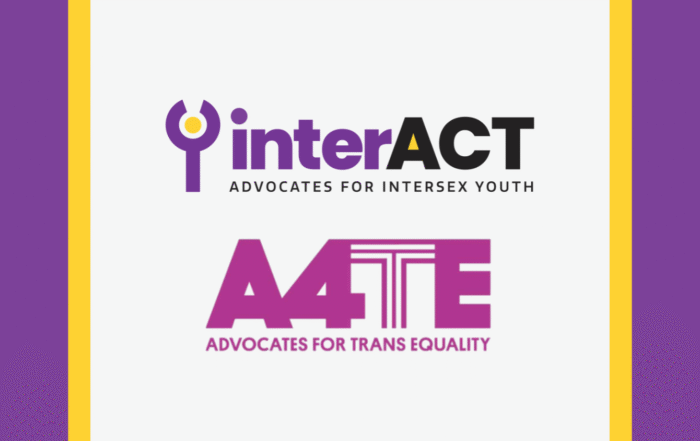interACT Law & Policy

interACT’s founder, Anne Tamar-Mattis, JD.
interACT works across the nation and beyond to protect children born with intersex traits and ensure that the human rights abuses experienced by the intersex community are put to an end. To accomplish this, interACT advocates on behalf of intersex youth in the courts, in the development of local and national policy, and through collaboration on research to address pressing issues identified by the intersex community.
interACT remains the only intersex-led advocacy organization in the United States with the ability to employ full-time lawyers who work for intersex bodily autonomy.
More About Laws and Policies Protecting Intersex People
Important Intersex Law Resources and Historical Documents
- Amnesty International’s Policy Statement on the Rights of Intersex Individuals (2017)
- interACT’s Report to the United Nations Special Rapporteur on Torture (2017)
- The Darlington Statement – a joint call to action from Australian and Aotearoa/New Zealand intersex groups (2017)
- United Nations Intersex Fact Sheet (2016)
- UN Free & Equal’s Intersex Campaign (2016)
- Public Statement from the 3rd International Intersex Forum (2013)
- Survey Results: 5 Top Priorities for DSD Care (2013)
Law & Policy Posts from the Blog
U.S. House moves to criminalize consensual gender-affirming care, endorse nonconsensual intersex surgeries
For Immediate Release: June 10, 2025 Press contacts: A. Lazarus Orr, press@transequality.org Sylvan Fraser Anthony, sfraser@interactadvocates.org PDF Available Here. Today, H.R. 3492, a Congressional bill criminalizing gender-affirming care while endorsing intersex genital mutilation,
Marjorie Taylor Greene’s ban on consensual healthcare openly endorses mutilation of intersex children
The mask is off. Marjorie Taylor Greene’s “Protect Children’s Innocence” Act does no such thing—it plainly states that “genital or bodily mutilation” is “not a violation” when carried out on minors with intersex variations
No care, just control – the intersex mutilation exceptions in gender-affirming care bans
More than half of states now have laws in place that bar access to gender-affirming care—the consensual, necessary healthcare that allows transgender teens and young adults to feel at home in their bodies. All




